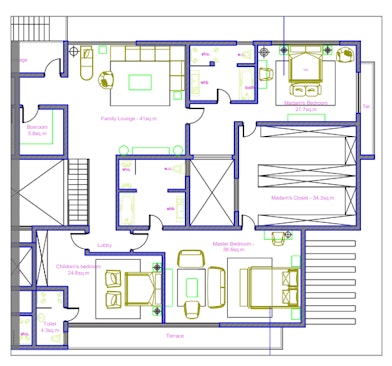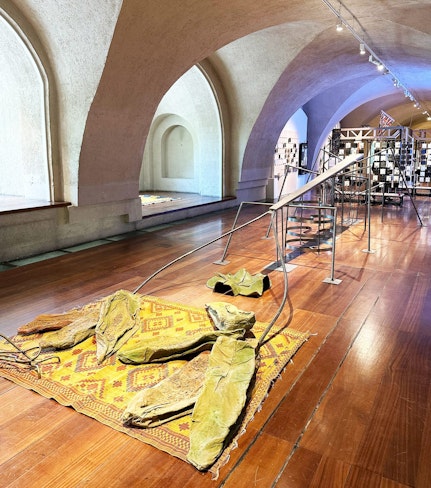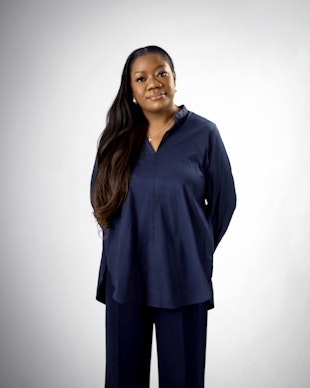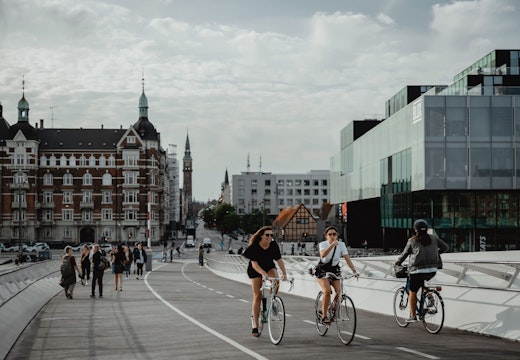Lines from Lagos: how the Nigerian workspace market in expanding
Adewunmi Adegbola produced the Nigerian Pavilion at the 2023 London Design Biennale. In this interview she discusses the design approach of her practice Siriano as the Lagos market develops
What is the Lagos workplace design market like? What are the key trends and themes?
Adewunmi Adegbola: The Lagos workplace design market is growing along with the long-term prospects of business in Nigeria. Due to Lagos’ position as the commercial capital of the country, companies like Google, Microsoft and Sony Music have invested in a physical presence in the city. However, we note that only a handful of clients exist at the highest levels of workspace design briefs in the interim.
Siriano employs creative solutions to remain competitive and to really stand out from the other talented design firms in the market. Workspace design continues to improve in the Lagos market, especially in comparison to other parts of the region. We are glad to be operating in the bustling, busy and elastic city of Lagos.
What advice would you give multinationals developing new workspaces in Nigeria?
Research and critical thinking are key elements of a healthy work environment, and more so in creating an indigenous work environment that addresses and enhances the subtle nuances of the typical Nigerian work culture whilst also taking design rules and standards into consideration. Multinationals entering the Nigerian market should collaborate with design firms that value research-based solutions and understand the local market based on practical experience. This will ensure that the workspace design is the right blend of the client’s brand and work culture, as well as the Nigerian workspace culture.
What is your company’s design ethos? What inspires you?
At Siriano, we believe that space design can be improved significantly by seamlessly merging aesthetics and the human experience. Our approach is therefore always to begin our design process by thinking about how the end users transition through a space, as well as factors that enhance the spatial experience.

Image: Courtesy of Siriano
Our educational and professional experience in design has exposed us to how design can be used to enhance the human experience. We have continuously seen this approach often neglected in our market. These everyday observations as well as our continuous desire to match great design ideas with seamless execution serve as a major inspiration for us.
Who do you work for and what have been the key learnings from your projects?
Our clients range from private companies and individuals to sub-national governments and their ministries, departments and agencies. Our journey through different sectors has allowed us to gain the necessary experience to grow as an organisation while exposing us to the peculiarities of our immediate environment.
Over the years, we have collaborated with both local and foreign partners, and therefore have experience with partners and clients from a range of cultures. We also have a firm grasp of indigenous design interpretations, stakeholder management, and most importantly, a will to accommodate our client’s preferences in a manner that aligns with design principles.
How important is sustainability for you in the sector?
Sustainability is at the core of Siriano’s operations, reflecting both a sense of responsibility and a dedication to preserving local identity. We recognize that over-reliance on imported materials can erode local culture and exacerbate environmental problems. As such, we actively seek indigenous solutions that align with the bespoke needs and traditions of our region, reducing our carbon footprint in the process.
‘Over-reliance on imported materials can erode local culture and exacerbate environmental problems…’
This includes embracing contemporary art made from recycled materials and upcycling, a practice that not only embodies our commitment to environmental stewardship but also fosters creativity and innovation. By focusing on minimalist design, building reuse projects, and collaborating with others who share our passion for sustainability, we aim to be a leading advocate for eco-friendly practices in the interior design sector in Nigeria. Our commitment to sustainability isn’t merely a trend; it is a deeply ingrained part of our ethos, driving our creativity and guiding our decision-making every day.
How was the experience of designing the Nigeria pavilion at the London Design Biennale?
London Design Biennale was a special, yet eye-opening experience for me with its many ups and downs. Raising money for Nigeria’s participation was daunting, but in the end it was a fulfilling experience which I would be pleased to do again, albeit differently.

Image: Nigerian Pavilion at the London Design Biennale 2023
I’m also involved in the Viaduct Design and Creativity Foundation, which advocates for design talent and creativity from Nigeria, helps build these talents and creates opportunities for them to be showcased on a global platform. Our foundation will bridge the gap between under-privileged Nigerian creatives and the international design world that seems so far away from them. Our areas of interest include architecture and spatial design, interior design, furniture design, product design, graphic design, game design and many others.

Adewunmi Adegbola








